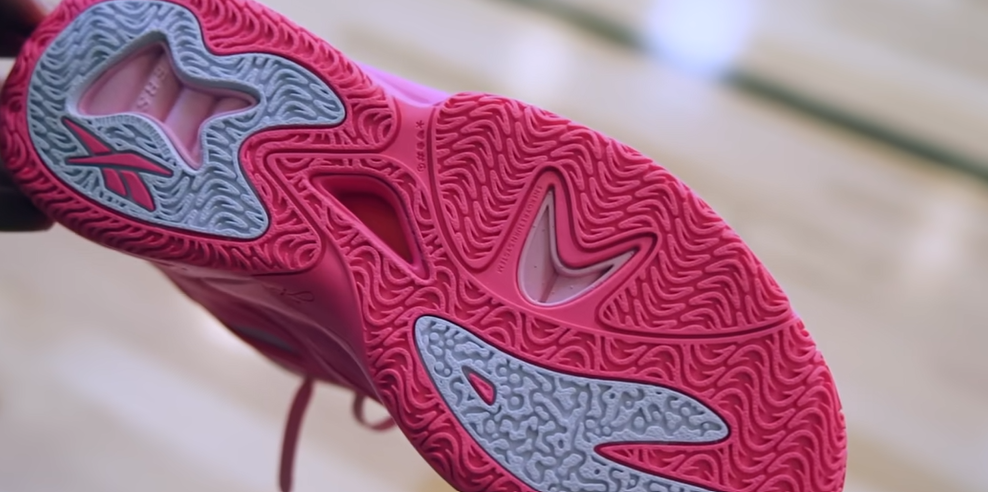With the release of the Angel Reese 1, performance and personality came together to create a product that had an impact well beyond the basketball court, marking a particularly inventive moment in sneaker and basketball culture. When all three of the initial colorways sold out within hours, the Reebok partnership—which was founded on Reese’s distinctive fusion of athletic dominance and cultural influence—proved to be incredibly successful. Diamond Dust, Mebounds, and Receipts Ready were all in high demand because they reflected Reese’s self-assured style, making the launch as much a fashion statement as an athletic achievement.
In addition to their cultural impact, the shoes’ engineering is what makes them unique. For basketball’s stop-start demands, the sneakers’ bounce and shock absorption are incredibly effective thanks to Reebok’s Energy Return System and nitrogen-infused SuperFloatTM foam. Stability without compromising style is guaranteed by the molded upper construction with breathable mesh panels, and movement under pressure is reinforced by a TPU stability cup. This blend of style and technology is incredibly clear in its goal: to give anyone who enters them speed, durability, and confidence.
The path taken by NBA legends to launch their own signature shoe is remarkably similar to Angel Reese’s. Similar to how Allen Iverson became Reebok’s mainstay in the 1990s, Reese is updating the company’s basketball logo for the modern era. A symbolic passing of the torch is represented by her partnership with Allen Iverson, who is still an ambassador, and Shaquille O’Neal, who is currently the head of Reebok basketball. Because of their guidance and Reese’s ambition, her shoes are not only a commercial success but also have cultural significance.
Table: Angel Reese – Bio and Career Information
| Category | Details |
|---|---|
| Full Name | Angel Reese |
| Date of Birth | May 6, 2002 |
| Birthplace | Randallstown, Maryland, USA |
| Height | 6 ft 3 in (191 cm) |
| Occupation | Professional Basketball Player (WNBA – Chicago Sky) |
| Position | Forward |
| College | LSU (Louisiana State University) |
| Known For | 2023 NCAA Champion, WNBA star, “Bayou Barbie,” cultural influencer |
| Shoe Brand | Reebok – Angel Reese 1 (signature line) |
| Notable Achievements | Fastest WNBA player to 500 points & 500 rebounds; Vogue & NBA 2K cover |
| Reference Link | https://www.reebok.com/collections/angel-reese |

The launch’s symbolism was particularly enduring for female athletes. Previously, it was uncommon to find signature sneakers for female athletes, indicating that brands were hesitant to make investments in the women’s game. In recent years, that has significantly improved as Breanna Stewart, Sabrina Ionescu, and A’ja Wilson have secured their own lines. With Reese’s arrival, this trend picked up speed, demonstrating that demand was not only there but also growing much more quickly than expected. When Reebok showed flexibility by pushing her release from 2026 to 2025, Reese rewarded them with an instant sell-out, which was especially advantageous for the company’s comeback.
The launch’s emotional resonance increased its impact by another level. The risk of releasing three designs at once was acknowledged by Reese, who acknowledged that she was “in full tears.” She was very explicit in her appreciation of her fans, which strengthened her reputation as a competitive and approachable role model. A shoe drop was elevated into a cultural moment by this intimate connection, which was further shared on Instagram and TikTok. Just as Rihanna’s Fenty Puma partnerships or Beyoncé’s Ivy Park collections turned into cultural icons, Reese’s sneaker launch encapsulated an empowering vibe that extended well beyond the court.
From a business standpoint, fans found the success to be surprisingly inexpensive in comparison to high-end partnerships. Young athletes could join the movement thanks to the Angel Reese 1s’ $120 price tag, which struck a balance between affordability and performance. The shoes’ affordability and Reese’s celebrity status made them extremely adaptable, fitting both casual streetwear and competitive basketball. For those who identify with Reese’s unreserved quest for greatness, the sneaker became more than just a commodity; it became a symbol of solidarity.
The wider sneaker market paid attention. Reebok, a brand that had previously been relegated to nostalgia but was now clearly resurgent, presented a fresh challenge to the long-dominant Nike and Adidas. Similar to Puma’s resurgence through Rihanna, Reebok is undergoing a repositioning through Reese, with her growing fame serving as both a strategy and a narrative. The launch has significantly increased Reebok’s market share, according to analysts, generating momentum that may support future partnerships and solidify Reese as a mainstay of contemporary sports marketing.
Her shoes also demonstrate a change in the way athletes develop their brands on a cultural level. Reese, who appeared on the covers of Vogue and NBA 2K’s WNBA edition, is more than just an athlete; she is a cultural influence who can draw attention from a wide range of sectors. By fusing personality, athleticism, and style, she is changing the way young fans perceive female athletes—not as inferior to their male counterparts, but as cultural and athletic leaders. This change is incredibly resilient and will likely become ingrained in future sneaker line concepts.
The way the Angel Reese 1s capture performance, identity, and aspiration all at once is what sets them apart. The design itself reflects her playing style, which is bold, unflinching, and stylish under duress. Her signature “Bayou Barbie” identity is reflected in the pink Mebounds colorway, while Diamond Dust sparkles to match her glitz and Receipts Ready radiates polished confidence. The shoes are incredibly effective at reaching a variety of audiences because of these options, which guarantee that fans can identify with whichever aspect of Reese most strongly appeals to them.

